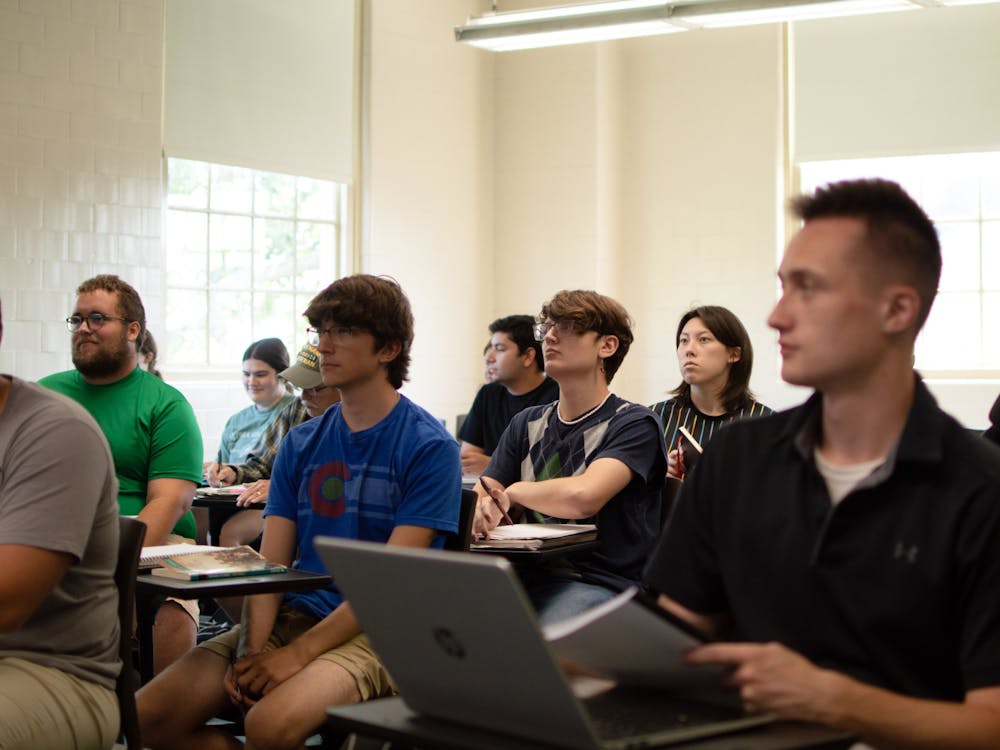The following reflects the majority opinion of the editorial board.
Last week, Miami University sophomore Conor Phlegar tweeted that Chanel Miller, the woman sexually assaulted by Brock Turner at Stanford in 2015, was raped as a consequence of being drunk. After he deleted the tweets, he wrote that he stood by what he said and hoped what he said resulted in individuals expanding their views on rape.
Miami's administration responded by tweeting that Phlegar’s views did not align with the University’s Code of Love and Honor, and that victim-blaming has no place on Miami’s campus. The tweet was followed with resources on what to do if you or someone you know has been assaulted.
Miami is correct: victim-blaming shouldn’t have a place on Miami’s campus. And, yet, it clearly does when we know there are so many students like Phlegar on this campus.
Miami is once again hiding behind the Love and Honor brand rather than implementing real, authoritative action.
In reality, the Code of Love and Honor holds virtually no significance to the student body as it isn’t actually enforced in any measurable way. The code does not shield our community from views like Phlegar’s, nor does it do anything to help change them. They’re just empty words that are convenient to throw around at convocation or a PR opportunity. Few students can even recite it, and the ones that can most likely work for the university in some capacity.
So, using those words as a way to deflect responsibility for the culture fostered on campus is disappointing and disingenuous.
Phlegar’s words were reprehensible. Someone’s gotta say it.
It’s shameful that Miami didn’t take the opportunity to say that under no circumstance is sexual assault the victim’s fault. That the responsibility lies solely on the perpetrator of the assault, and that you should never assault another person — regardless of how drunk they were, what they were wearing, where they were, ad infinitum.
But Miami is scared to take an actual stance, and instead chooses to hide behind benign language and a hollow code.
We at The Miami Student believe we must recognize that a culture of victim-blaming exists at Miami. We also believe that, if the university isn’t going to take strong action against it, it’s up to the students to take responsibility for the culture that has been perpetuated on this campus.
Our campus — and our nation — always defaults to telling women how to defend themselves from being assaulted.
Enjoy what you're reading?
Signup for our newsletter
Women are told to never walk alone, never drink too much, or inevitably someone may take advantage of them. They take off their heels at night because they want to be able to run from an attacker if needed. They carry keys between their fingers, always tell a friend where they are late at night and try their best never to walk home alone.
Women are doing everything they can to not be sexually assaulted, so stop telling them to do more. The fact is, sexual assault should not be the expected default. We should instead be telling our peers to respect each other and not assault others.
To imply that someone is in charge of preventing their own sexual assault allows for a culture that looks to blame a survivor when there’s a perpetrator walking free from consequence and blame.
Thirteen sexual assaults were reported at Miami in the first month of school. Statistically, three out of every four sexual assaults are unreported. We are committing an injustice to our peers who have survived sexual assault by allowing Phlegar’s beliefs to be shared without addressing the gravity of his words.
Comments like Phlegar’s serve as a reminder of how harmful a lack of empathy can be, and that a victim-blaming mentality can exist within people close to us, whether it be a classmate, acquaintance or a friend.
It forces us to ask ourselves: are we holding our friends and peers accountable? Are we reacting to comments that perpetuate a culture of victim-blaming by educating ourselves and those around us of the negative impact those sentiments can have on our community?
Miami responded in a way that protected their own image.
And while our staff understands that freedom of speech prevents disciplinary action from being taken against Phlegar, we also believe merely separating the university from the problem is far from enough.
Without engaging, educating and holding members of our community accountable, the problem does not go away. It remains ever-present and perpetuates the pain of those who have survived assault.
This was better exemplified by the individuals who engaged with Phlegar and explained why what he said was problematic. Equally as encouraging were the individuals who called the university’s attention to Phlegar, and then let Miami know that their response was not satisfactory.
We believe it’s time for our student body to take our campus culture into our own hands, because it’s not coming from the top down anytime soon.
We cannot tolerate those who blame survivors for their assaults.
We must demonstrate Love and Honor by supporting and caring for our fellow Miamians by empathizing with those who feel fearful or unsafe.
We must act through our words and deeds in ways that reflect these values and beliefs, and call things as we see them.
After all, it’s what the Code of Love and Honor actually calls for.



